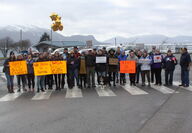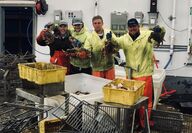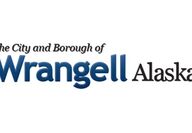Sorted by date Results 51 - 75 of 165
It’s looking to be a very good summer for pink salmon commercial fishing, much better than last year’s dismal catch. The pink harvest in Southeast was just over 44 million fish as of Sept. 3, over 50% more than the 28 million forecast issued after the 2020 season, according to the state’s preliminary commercial salmon harvest report. And more than five times the catch of last year. “For pink salmon, we’re around 40 million for the harvest for the Southeast region,” said Paul Salomone, a management biologist for the commercial fisheries d...

Trident Seafoods has notified city officials the company will not reopen its Wrangell plant this summer. Plant manager Nick Ohmer called on Tuesday with the expected news, Borough Manager Lisa Von Bargen told the assembly at its evening meeting. "I had a conversation with him about what it would take to get the plant back open here in Wrangell," Von Bargen said. Ohmer responded that the seafood processor would need "to see somewhere between 40% and 50% more fish chums than were projected to retu...

January Jan. 2: Along with the lights, trees and carolers, the Salvation Army's red Christmas kettles are a common sight during the holiday season. Lt. Jon Tollerud, Wrangell's new corps officer, said the red kettles brought in $10,469. Jan. 9: The Nolan Center celebrated the new year Dec. 31 with a murder mystery party. As this new year marks a new decade, a return to the '20s, the party had a 1920s theme to it. With jazz music, themed costumes and masks, partygoers had the chance to return to...
Alaska coastal communities will get a bit of an economic boost in 2021 from increased catches of Pacific cod. The stock, which crashed after a multi-year heat wave starting in 2014 wiped out several year classes, appears to be rebounding throughout the Gulf of Alaska. No cod fishery occurred at all this year in federally managed waters (from three to 200 miles out) where the bulk of the harvest is taken, and a catch of under six million pounds was allowed in state managed waters (out to three miles). For 2021, the North Pacific Fishery...

December 17 Jamie Roberts, with the Wrangell EOC, reported that there are currently no active cases of COVID-19 in the community. Statewide, Alaska’s case count is 41,859 as of yesterday. This is an increase of 3,151 from last week. Wrangell received its first shipment of COVID-19 vaccines Wednesday afternoon, Dec. 16. According to SEARHC, following guidance from the Alaska Vaccine Advisory Council, vaccinations will be given to frontline health workers first, along with first responders, and l...
A lack of fish in the freezers is an encouraging sign for Alaska salmon as we head into the new year, driven by increasing customer demand. But headwinds from trade disputes and the Covid pandemic also loom large on the 2021 horizon. Those are some prime takeaways shared by Mark Palmer, president and CEO of OBI Seafoods, and Allen Kimball, vice president of global operations and sales for Trident Seafoods. “We don’t see entering the 2021 season with any real big carryovers. And that’s always one of the downsides as we head into a new seaso...

Throughout the COVID-19 pandemic, Alaska has faced its share of monumental challenges. The testing of all incoming travelers, providing relief for devastated tourism businesses, creating a new unemployment program from scratch. Yet none compared to the challenge of protecting our critical seafood industry and the communities that rely on their economic production. We commend Alaska's seafood industry for successfully navigating the most difficult season Alaska has ever experienced. Captains,...
Snacks that are good for people and the planet now come in the form of crispy chips that are made from Bristol Bay sockeye salmon skins. The new, flash fried snack was spawned by a Los Angeles-based company called Goodfish, which aims to “propel sustainable seafood into our mass-market consumer culture.” It is the second venture for partners Justin Guilbert and Douglas Riboud, a well-financed duo who are committed to trailblazing brands that have “higher standards of sourcing, manufacturing, and social ethos.” A decade ago they co-foun...

Several local fishermen have been volunteering their time and energy, more so than usual, at Wrangell's sole operating seafood processor. With the decision by Trident Seafoods to not operate this summer, Sea Level Seafoods has been the only local option available for fishermen to process their catches. However, thanks to a number of factors brought on by COVID-19, Sea Level has been shorthanded. This has led to a number of fishermen volunteering to help process crab, as well as catch them....
PETERSBURG – An employee with Trident Seafoods has tested positive for COVID-19 on the individual’s tenth day of quarantine after arriving to the community, according to a press release from the Petersburg Emergency Operations Center. All Trident Seafoods employees that travel to Petersburg are tested for the virus prior to arriving in town and are quarantined in a bunkhouse upon arrival, according to the press release. The workers are then tested again on the tenth day of a 14 day quarantine. The individual’s roommate was also tested on the...

The Wrangell Borough Assembly met this week to begin their workshopping of Wrangell's budget for FY 2021. This first round of workshops looked at various city departments that are funded through the Enterprise Funds which includes the harbor, light and power, sanitation, wastewater, and water departments. There were two workshops over the past week, on May 19 and May 21. According to the meeting's agenda packet for May 19, there were several things for the assembly to keep in mind when looking...
Giving COVID relief funds to the seafood industry and stepping on the gas for offshore fish farming are two big takeaways from the executive orders and congressional packages coming out of the nation’s capital. Recent news that Alaska would receive $50 million from the $300 million fisheries relief funds in the Coronavirus Aid, Relief, and Economic Security (CARES) Act was well received by industry stakeholders and it’s likely to be followed by more. A May 15 hearing called “COVID 19 impacts to American Fisheries and the Seafood Supply Chain...

Wrangell's Unified Command participated in their weekly conference call on Wednesday, May 6, to provide organizational updates on COVID-19 developments and changes in respective protocols. The City and Borough of Wrangell (CBW) mayor and manager were joined by Wrangell Medical Center (WMC) and Emergency Medical Services (EMS) leadership, as well as Tribal and Public Health representatives, to discuss Borough Assembly allocations, testing initiatives, and available community resources. Borough...

With Health Mandate 16, part of Governor Mike Dunleavy's plan to reopen Alaska's economy safely during the COVID-19 pandemic, communities across the state are considering what the near future may look like. Revenues have fallen for the city and businesses have had to get creative to stay open. While there is optimism to be found amongst some business owners, uncertainties loom for the economy in general. Alan Cummings, of All In Charters and Grand View B&B, said that they are looking at a rough...

Representatives of the City and Borough of Wrangell and the local seafood industry held a workshop on Tuesday, April 7, to discuss how public health can be protected with fishing season drawing near. There were over 30 people who called into the meeting, in total. The meeting was chaired by Assembly Member Julie Decker. "I think, in my opinion, the goal is to move the city in a direction of a set of policies, and procedures, and requirements, for the seafood industry that keep the community...

Trident Seafoods, one of the two main seafood processors in Wrangell, has decided not to operate during the upcoming salmon season. Stefanie Moreland, vice president of government relations, seafood sustainability, and corporate social responsibility with the Trident Seafoods Corporation, explained that this decision was made earlier this year. Predictions of a low abundance of salmon in Southeast Alaskan waters led them to the decision to not operate the Wrangell plant this season. However, Mor...
Dutch Harbor remained the top fishing port in the USA for the 22nd year in a row with 763 million pounds crossing the docks in 2018 valued at $182 million. And Naknek ranked as the nation’s second most valuable port for fishermen with landings worth $195 million. (Naknek also ranked #8 for landings at $191 million.) Empire-Venice, Louisiana held the second spot for fish volume (569 million). The “Aleutians” was close behind (539 million), thanks to Trident’s plant at Akutan, the largest processing facility in North America. Kodiak fell to four...
Every year since 1991 Fish Factor has selected “picks and pans” for Alaska’s seafood industry - a no-holds-barred look back at some of the year’s best and worst fishing highlights, and my choice for the biggest fish story of the year. Here are the 2019 picks and pans, in no particular order - Best fish scientist – Dr. Bob Foy, director of science and research at NOAA’s Alaska Fisheries Science Center/Juneau – No one explains science better or with more passion. Biggest new business potential: Mariculture. Alaska is acting on plans to grow a $10...
They say good things come in small packages and that’s the case for Alaska cod fishermen heading into the new year. A small cod fishery will occur in Gulf state waters (out to three miles) for 2020, putting to rest speculation that no cod would be coming out of the Gulf next year. A catch quota of about 5.6 million pounds, down from 10.2 million pounds, will be split among five regions: Prince William Sound, Cook Inlet, Kodiak, Chignik and the South Alaska Peninsula, with limitations on gear and staggered openers. That will be a relief to thous...
Salmon dominates the summer fishing headlines but it’s among many other fisheries going on throughout the Gulf of Alaska and Bering Sea. Alaska’s salmon season has gotten off to a mixed start, with strong catches in some regions over the past month and dismal hauls in others. Good harvests have continued at the Copper River and more recently throughout Prince William Sound. That’s not been the case at Kodiak, Cook Inlet and Chignik where fishing is off to a very slow start. Trollers are targeting Chinook salmon in Southeast, and other salmo...

Push that pasta aside. Noodles made from Alaska pollock are poised to become a center of the plate favorite. Alaska Pollock Protein Noodles from Trident Seafoods swept the awards at the 26th annual Alaska Symphony of Seafood new products competition in Juneau. The low carb, "flavor neutral" noodles contain 1O grams of protein per serving and can be swapped with any pasta favorites. The ready to eat item drew raves from judges and samplers from Seattle to Southeast who gave the noodles quadruple...
The past year has been a busy one for the community of Wrangell, and also one full of changes. Elections have come and gone, the school district saw a new superintendent and two new principals, a high school swimming and diving team was organized, and a new reporter came to town. A new organization was formed, BRAVE, to help bring people together to enhance life in the community for Wrangell’s younger population. Other organizations like the Senior Center and Nolan Center saw new faces, as well. There were lots of physical changes to W...
Protein Noodles by Trident Seafoods took top honors at the 26th annual Alaska Symphony of Seafood, winning first place in the retail category and the Seattle People’s Choice award. The winners were announced last week at Pacific Marine Expo. The refrigerated noodles are made from pollock surimi and touted as a high protein, gluten free alternative to traditional pastas. “All pastas are wheat based and they don’t contain any protein and there’s not a lot of nutritional value,” said John Salle, Trident’s senior vice president of marketing, innova...
Offshore fish farms could soon dot the sea scape along with those oil and gas platforms being proposed for U.S. waters by the Trump Administration. The fish farms, which would be installed from three to 200 miles out, are being touted as a way to boost seafood production, provide jobs and reduce the nation’s $16 billion trade deficit due to America’s importing nearly 90 percent of its seafood favorites. The U.S. Commerce Department is holding meetings around the country through November to talk about its strategic plan for getting aqu...
Alaska appears to be an exception in terms of gender parity at all levels of its seafood industry. Women comprise roughly half of the world’s seafood industry work force, yet a report released last week revealed that 61 percent of women around the globe feel they face unfair gender biases from slime lines to businesses to company boardrooms. The women’s overall responses cited biases in recruitment and hiring, in working conditions and inflexible scheduling. The findings were based on 700 responses gathered in an online survey from Sep...